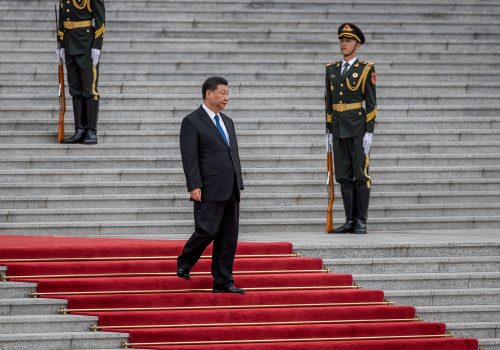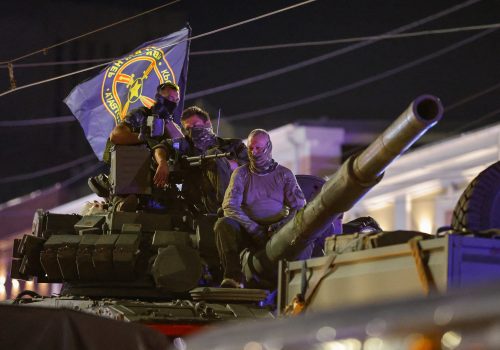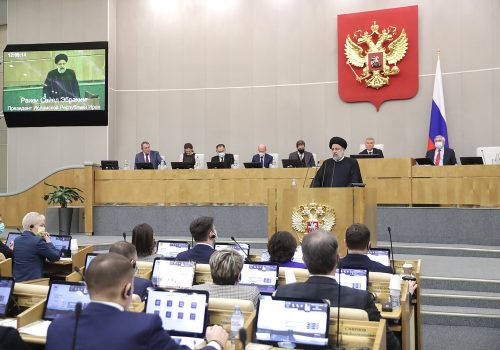Is Russia really siding with the UAE against Iran?
There has been much reporting recently about how Iran is annoyed with Russia for its apparent siding with the United Arab Emirates (UAE) on the Iran-UAE dispute over three islands in the Gulf.
These three small islands—Abu Musa, Greater Tunb, and Lesser Tunb—had been claimed by Shah Mohammad Reza Pahlavi. However, they were originally under British control when Britain exercised its “protectorate” over the seven emirates that became the UAE upon independence from the United Kingdom in 1971. Just as the British were leaving, the shah’s forces seized the three islands, which have remained under Iranian control from the 1979 Islamic revolution up to the present. Since the Iranian takeover, the UAE has unsuccessfully sought the return of these islands—first from the shah and then from the Islamic Republic of Iran. However, the UAE has also not been in a position to retrieve the islands forcibly, and none of its various partners—including the United States—have been willing to help it do so. The UAE, though, has frequently reiterated its claim to them over the years.
On July 10, a joint statement was issued at the Russia-Gulf Cooperation Council (GCC) meeting held in Moscow, which called for “bilateral negotiations or the International Court of Justice [ICJ], in accordance with the rules of international law and the United Nations Charter, to resolve this issue is in accordance with international legitimacy.”
This statement might seem innocuous enough, but it was met with a highly negative reaction in Iran from officials and even some in the public. On July 12, the Russian ambassador to Tehran, Alexey Dedov, was summoned to the Iranian Foreign Ministry, and Moscow was asked to “correct its position.” Many Iranians commented negatively on the Russian Foreign Ministry’s Arabic Twitter account’s announcement of the Russia-GCC meeting, including forcefully stating their view that the Gulf should be referred to as Persian and not Arab.
After years of tensions, ties between the UAE and Iran improved in August 2022 when the two countries agreed to resume full diplomatic relations, which had been downgraded in 2016 (after attacks on the Saudi missions in Tehran and Mashhad in response to the execution of Saudi Shia cleric Nimr Baqir al-Nimr). Nevertheless, Iran considers its ownership of the three islands a settled fact and is unwilling to negotiate with the UAE nor allow the ICJ to rule on the matter. For Moscow to endorse the UAE and GCC position is especially galling to Tehran, considering how much Iran has done to support Russia in its war with Ukraine. This includes selling Iranian armed drones to Russia and even helping Moscow build a drone factory inside Russia.
Why would Moscow do this? One possibility is that Russia, which is under punitive international sanctions, hopes to beef up its exports to and investments from the UAE and other GCC states—something that Iran cannot provide due to its economic difficulties exacerbated by Western sanctions. Russia-UAE trade rose by 68 percent in 2022 to $9 billion, consisting mainly of Russian exports to the UAE ($8.5 billion). Moscow’s siding with the GCC on this issue may also be based on a cold Russian calculation: while the UAE and other GCC states can cooperate with either the West or Russia, it does not have to fear the prospect of increased Iranian-Western cooperation breaking out. This allows Russia to disregard Iranian preferences, even though Russia has become dependent on Iranian military assistance.
By contrast, the UAE and other GCC states—Bahrain, Kuwait, Oman, Saudi Arabia, and Qatar—are highly gratified that Moscow has backed their position on the need to resolve the disputed islands issue. They can also point to Moscow’s doing so as a reason for resisting American calls for the Gulf Arab states to distance themselves from Russia and join the West in imposing economic sanctions on Moscow. Indeed, GCC states can argue that Russian support for their position on resolving the islands dispute demonstrates the usefulness of their cooperation with Russia.
Still, it is essential not to exaggerate the significance of the Russia-GCC joint statement on resolving the Iran-UAE dispute. As both Moscow and Tehran are fully aware, Iran will not enter into negotiations with the UAE, much less allow the International Court of Justice, to arbitrate their dispute. The Russia-GCC joint statement does nothing to alter the fact that Iran remains in control of the three islands and is likely to remain so.
Mark N. Katz is a professor of government and politics at the George Mason University Schar School of Policy and Government, and a nonresident senior fellow at the Atlantic Council.
Further reading
Wed, Feb 23, 2022
China and Russia are proposing a new authoritarian playbook. MENA leaders are watching closely.
MENASource By Ahmed Aboudouh
It’s on major Western democracies to make democracy appealing again by aggressively filling the gaps China and Russia exploit to make the world more accommodating to their political models and the new trend of rising authoritarianism.
Wed, Jun 28, 2023
The Wagner rebellion is over—for now. But how will the events reverberate in the Middle East and North Africa?
MENASource By Mark N. Katz
The June 23-24 rebellion led by Wagner Group leader Yevgeny Prigozhin—aimed, he claimed, at replacing the Russian Defense Minister Sergei Shoigu and Chief of the General Staff Valery Gerasimov (not Russian President Vladimir Putin)—has ended. However, reverberations from it are likely to continue being felt beyond Russia, such as in the Middle East and North […]
Mon, Mar 7, 2022
As the world shuns Russia over its invasion of Ukraine, Iran strengthens its ties with Moscow
IranSource By
Iran’s support for Russian actions reflects the improvement in bilateral ties, which have grown considerably at the political and military levels over the past decade.
Image: Oman's Foreign Minister Sayyid Badr bin Hamad bin Hamood Albusaidi attends a meeting of Russian Foreign Minister Sergei Lavrov and his counterparts of the Gulf Cooperation Council (GCC) member states and the GCC secretary general in Moscow on July 10, 2023. NATALIA KOLESNIKOVA/Pool via REUTERS


